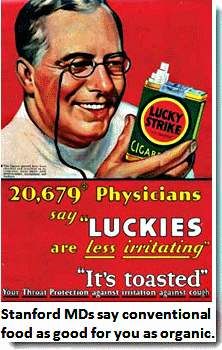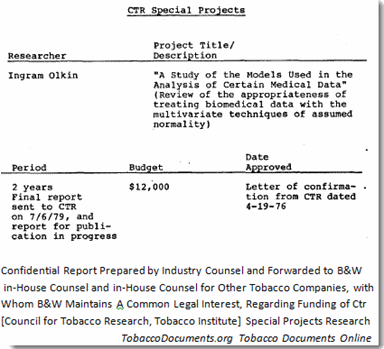 September 6, 2012 at 05:22:56
September 6, 2012 at 05:22:56

A widely publicized study claiming that there is no demonstrated
difference in nutritional value between organically and conventionally
grown foods just appeared in the Annals of Internal Medicine. Broad mainstream media coverage produced headlines like Stanford Scientists Cast Doubt on Advantages of Organic Meat and Produce. The media failed to mention one point that may be of major interest.
The study relied on a statistical technique called meta-analysis.
Over 200 plus scientific journal articles were combined as the data set
for the study. The article co-author with recognized expertise in
meta-analysis, Ingram Olkin, applied for a grant from Council of Tobacco Research (CTR) in 1976.
CTR was part of the infamous Tobacco Institute,
an industry group of cigarette manufacturers. Ingram was on the faculty
of Stanford University at the time. The authors of the current study
diminishing the value of organic foods are also from Stanford
University, with Olkin listed as a professor emeritus.
Olkin applied to the CTR to conduct a project on the statistical methods used in the Framingham Heart Study,
the landmark project linking cigarette smoking with increased risk of
heart disease. From publicly available tobacco industry documents, we
find this from cigarette manufacturer lawyers:
"I
met with Dr. Olkin and Dr. Marvin Kastenbaum [Tobacco Institute
Statistics Director] on December 17, 1975, .at which time we discussed
Dr. Olkin's interest in multivariate analysis statistical models. Dr.
Olkin is well qualified and is very articulate. I learned, in visiting
with Dr. Olkin, that he would like to examine the theoretical structure
of the "multivariate logistic risk function."
The Tobacco Documents
describe Katzenbaum as knowledgeable of "the tobacco industry's
participation in the public disinformation regarding the health hazards
of tobacco use ""
According to internal tobacco company documents
from cigarette manufacturers, Olkin received a grant from CRT and
submitted a final paper in 1979. The paper could not be found online.

Olkin's work for the Tobacco Institute was originally discussed by Robert N. Proctor Golden in his January 2012 Google eBook, Golden Holocaust: Origins of the Cigarette Catastrophe and the Case for Abolition, University of California Press. Columbia University professor Andrew Gelman
cited Olkin's work in his September article in the journal Statistics
and Ethics, which discusses the ethical challenges of statisticians when
working for big business.
Objective statistical analysis was central to this study
Professor
Olkin's specialty, meta-analysis, was the research technique employed
to generate the findings for the study designed to debunk the value of
organic foods. Contrary to the conclusion that there's little evidence
of a difference in nutritional value, the article notes that "Two
studies reported significantly lower urinary pesticide levels among
children consuming organic versus conventional diets." The researchers
say that they "did not identify clinically meaningful differences" in
measures among adults. That's a statistical inference. The study found
"phosphorus levels were significantly higher than in conventional
produce, although this difference is not clinically significant." Again,
the statistical analysis negated a finding in favor of organic produce
based on statistical analysis.
The researchers concluded::
"The
published literature lacks strong evidence that organic foods are
significantly more nutritious than conventional foods. Consumption of
organic foods may reduce exposure to pesticide residues and
antibiotic-resistant bacteria."
The mainstream media picked up and ran with this relatively obscure research. The New York Times headline reads, Stanford Scientists Cast Doubt on Advantages of Organic Meat and Produce. Fox News had this to say: Study says organic food may not be worth the money. Bucking the tide, the Los Angeles Times editorialized against the study's significance in a major editorial, the case for organic food.
Studies
like the one out of Stanford are less about the quality of the research
than they are about the headlines when mainstream media gets involved.
In this case, the findings prop up conventional foods at the expense of
organics by the mere mention of Stanford researchers claiming there's no
nutritional difference.
This minor article was picked up by media
all over the country. No doubt, it raised questions for some who are
currently buying organic foods and those who were considering making the
switch from conventional to organic.
This value of this type of narrow research was discussed by the Tobacco Institutes legal counsel William W. Shinn when he recommended Professor Olkin's 1976 proposed study on the impact of cigarette smoking on heart disease:
"We
believe that a modest effort now may stimulate a broader interest in
such questions especially among theoretical statisticians at Stanford
and elsewhere."
Ironic, isn't it?
END
This article may be reposted with attribution of authorship and a link to this article.
The Money Party
www.themoneyparty.org
Michael Collins is a writer in the DC area who researches and comments
on the corruptions of the new millennium. His articles focus on the
financial manipulations of The Money Party, the abuse of power by
government, and features on elections and (
more...)
The views expressed in this article are the sole responsibility of the author
and do not necessarily reflect those of this website or its editors.




No comments:
Post a Comment